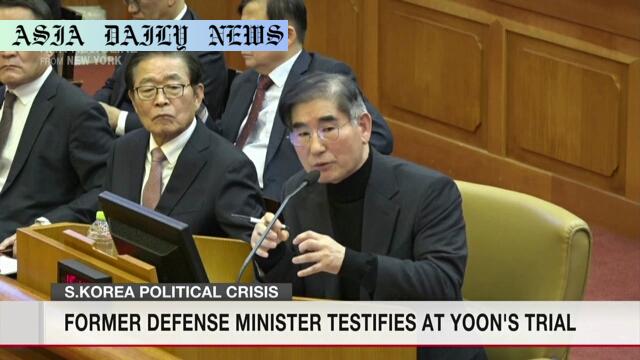The former South Korean defense minister testifies on proposed martial law plans, sparking significant debate at President Yoon’s impeachment trial.
President Yoon Suk-yeol faces impeachment over his brief martial law decision.
Former defense minister Kim Yong-hyun testifies about proposed troop deployments and decree drafting.
Yoon ordered fewer troops to limit public inconvenience, raising questions about enforceability.

Impeachment Trial and the Key Testimony
The ongoing impeachment trial of President Yoon Suk-yeol in South Korea has captured international and domestic attention, particularly with the testimony of former defense minister Kim Yong-hyun. Kim, who appeared as a witness during the trial’s fourth hearing at the Constitutional Court, revealed significant details about a brief plan for the imposition of martial law in December. His account has provided critical insights into the president’s decision-making process and raised questions surrounding the ethical implications of such declarations.
Details of Martial Law Preparation and Limitations
Kim Yong-hyun testified that he was tasked by President Yoon to prepare a draft decree outlining martial law plans. This draft initially included extreme measures such as banning all political activities across the nation. However, Kim explained that these provisions were altered after further deliberation and input from Yoon, who expressed concerns about the disruption it could cause to public life. Ultimately, the decree was modified to better reflect these concerns.
The Debate on Troop Deployment
A particularly contentious point from Kim’s testimony revolved around troop mobilization. Kim revealed that while he initially suggested deploying between 3,000 and 5,000 troops to enforce martial law, the president countermanded this recommendation, reducing the number to 250 soldiers. This decision appears to represent a conscious attempt to limit martial law’s impact and reduce the likelihood of public unrest. Kim acknowledged the president’s reasoning but confessed to personal doubts about whether such a reduced force could effectively enforce the measures outlined in the decree.
Yoon’s Attendance at the Hearings
The impeachment trial has garnered widespread attention, with President Yoon making frequent appearances at the court hearings. His presence underscores the gravity and high-stakes nature of the trial as both sides argue over the constitutional and ethical validity of his actions. The president’s legal team has sought to frame the decision as a careful and considered response to a pressing emergency, while critics argue it highlights a troubling overreach of executive power.
Constitutional Implications and Public Reaction
The events surrounding this trial reveal the constitutional complexity and political volatility of implementing martial law. While martial law remains a highly contentious issue, it is permitted under specific circumstances in South Korea. The question in President Yoon’s case lies in whether such actions were warranted under the conditions at the time or represent an abuse of executive authority. This legal debate has simultaneously sparked fierce discussions among the South Korean public, with many divided about whether these actions were necessary or excessive.
Global Significance of the Trial
The trial’s implications stretch far beyond South Korea’s borders, raising questions about the balance of power, democracy, and civil liberties in times of perceived national emergencies. International legal experts are closely observing the proceedings, as they could potentially set precedents for handling similar situations in other democratic nations. Concerns over transparency, proportionality, and adherence to constitutional standards loom large over the trial.
Concluding Thoughts
As the impeachment trial unfolds, all eyes remain on South Korea’s Constitutional Court to gauge whether President Yoon Suk-yeol will be held accountable for the declaration of martial law. The case has highlighted the ethical and political tightrope that leaders face when confronted with emergencies requiring decisive—but potentially divisive—actions. This moment in South Korea’s legal and political history will inevitably have long-term ramifications for governance and constitutional law within the nation.
Commentary
Constitutional Challenges in Leadership
The testimony presented by Kim Yong-hyun during President Yoon’s impeachment trial raises significant constitutional and ethical questions. It’s not every day that we witness a democratic leader facing legal scrutiny over a martial law declaration, an action that bears deeply on civic freedoms and the balance of power. As countries observe the evolving details from South Korea, this trial hints at the challenging dynamics leaders face when balancing public safety and civil liberties during national emergencies.
The Delicate Use of Martial Law
Martial law is rarely invoked and for good reason—it intrinsically conflicts with democratic principles. The president’s decision to limit troop deployment to reduce public inconvenience, while noteworthy, doesn’t exempt the move from robust scrutiny. Leaders must weigh every decision against its potential ramifications on both governance and public trust. Yoon’s dilemma serves as a cautionary tale for democracies worldwide about exercising caution when interpreting crisis powers.
A Legal and Political Milestone
This trial will not only determine President Yoon’s political future but also set a critical precedent for South Korea. Do the actions taken by South Korea’s government align with constitutional mandates? Can such extreme measures be considered justifiable under the circumstances cited? These are not just questions for the present but for any future leader confronted with similar dilemmas. The world cautiously waits for the Constitutional Court’s ruling, which may shape the balance between power and accountability for years.


